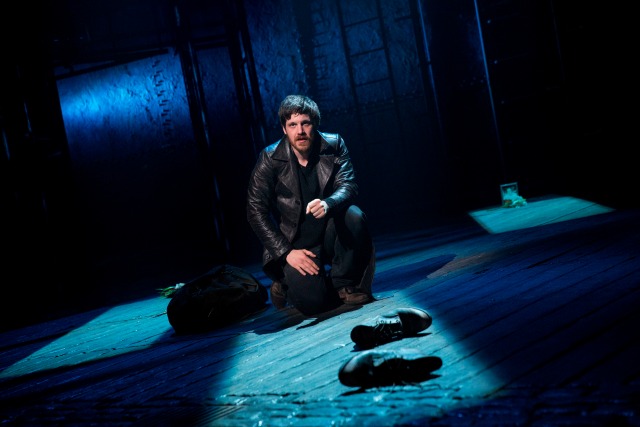Sting’s 'The Last Ship' A Solid Launch
By Melody Udell in Arts & Entertainment on Jul 2, 2014 4:00PM

Sting's 'The Last Ship' at Bank of America Theatre.
After much fanfare—a special performance at the Tony Awards, a one-night PBS broadcast— The Last Ship has docked in Chicago for its pre-Broadway tryout, and this vessel is helmed by none other than the show’s composer and lyricist, Sting.
It’s not a surprising move for Sting. In fact, he joins a group of stars who have attempted to transition their considerable songwriting talents to the stage, some successfully (Cyndi Lauper won a Tony for last year’s Kinky Boots), and others, well, not so much. (Bono and The Edge composed 2011’s Spider-Man: Turn Off the Dark, of which the score was just one of many problems.) But Sting’s songwriting for the stage fares much better: his songs, like show itself, are lush and sentimental.
While the show sounds great—also thanks to an outstanding ensemble—the compositions can’t quite fill in the holes left by the plot, which sets itself up as formulaic. Gideon, a teenager from Wallsend, a quaint town in northeastern England, refuses to become a blue-collar ship-builder like his hardened, abusive father. Instead, he flees to become a sailor, leaving behind his heartbroken girlfriend, Meg. Gideon promises Meg he’ll return soon, but he lets 15 years pass by before coming back to Wallsend, drawn home only after the passing of his father.
Gideon returns to find the community in turmoil. The shipyard has been bought out by a salvage company, and a majority of the town’s inhabitants have not only lost their jobs, but their dignity. It’s difficult to avoid comparing The Last Ship to another British, industrial working class musical, Billy Elliot.

Some of the musical’s most effective scenes take place back in the shipyards, despite the workers’ wounded pride and lack of paychecks. Steven Hoggett’s affected choreography contributes to the camaraderie, especially during the rousing “We Got Now’t Else.” The crusading Father Jim (a scene-stealing Fred Applegate)—who, appropriately, serves as the show’s moral compass—has encouraged the workers to build one last magnificent ship, symbolizing a community that’s setting sail on its heritage. The metaphor is heavy-handed, to say the least, but it gives the non-love-story side of the plot something to work toward. It’s here, though, that the show exhibits a lack of cohesion. Gideon, having at first refused to help out with the occupy shipyard movement, has a too-sudden turn of heart and starts helping the men—alongside his son, Tom—build the ship. (And book writers Brian Yorkey and John Logan don't explain what, exactly, Gideon was helping with since he presumably never learned the shipbuilding craft.)
Plot and character issues aside, The Last Ship is in pretty solid shape for its move to New York (more solid, in fact, that the last couple pre-Broadway try-outs that have come through Chicago recently). We can only hope that director Joe Mantello brings a little more humanity to his leading character and shores up a few weak plot points, and The Last Ship should cruise along on Sting’s earnest, heartwarming score alone.
The show runs through Sunday, July 13 at the Bank of America Theatre, 18 W. Monroe, 312-977-1700 or online.